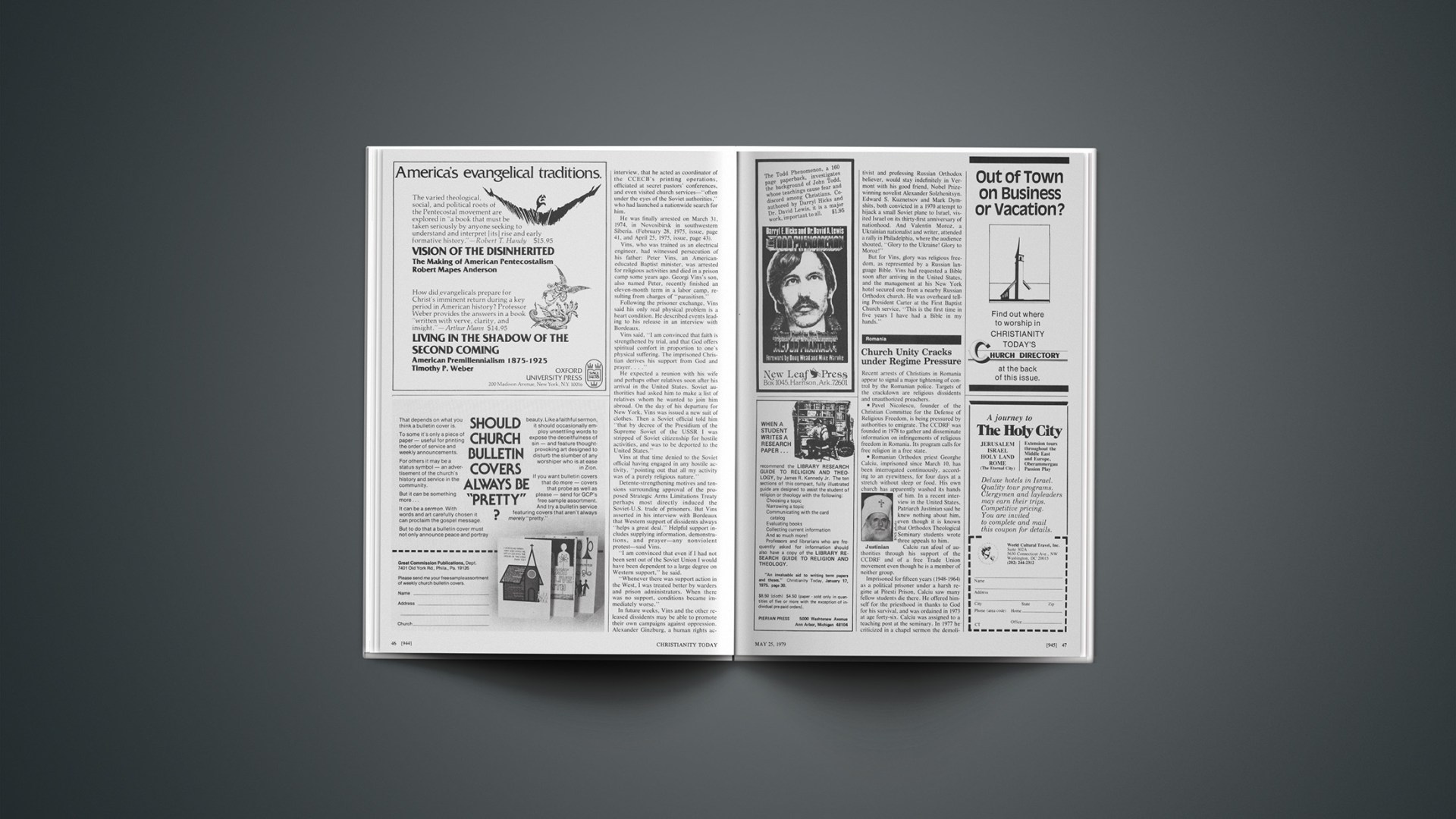Romania
Church Unity Cracks under Regime Pressure
Recent arrests of Christians in Romania appear to signal a major tightening of control by the Romanian police. Targets of the crackdown are religious dissidents and unauthorized preachers.
• Pavel Nicolescu, founder of the Christian Committee for the Defense of Religious Freedom, is being pressured by authorities to emigrate. The CCDRF was founded in 1978 to gather and disseminate information on infringements of religious freedom in Romania. Its program calls for free religion in a free state.
• Romanian Orthodox priest Georghe Calciu, imprisoned since March 10, has been interrogated continuously, according to an eyewitness, for four days at a stretch without sleep or food. His own church has apparently washed its hands of him. In a recent interview in the United States, Patriarch Justinian said he knew nothing about him, even though it is known that Orthodox Theological Seminary students wrote three appeals to him.
Calciu ran afoul of authorities through his support of the CCDRF and of a free Trade Union movement even though he is a member of neither group.
Imprisoned for fifteen years (1948–1964) as a political prisoner under a harsh regime at Pitesti Prison, Calciu saw many fellow students die there. He offered himself for the priesthood in thanks to God for his survival, and was ordained in 1973 at age forty-six. Calciu was assigned to a teaching post at the seminary. In 1977 he criticized in a chapel sermon the demolition of Bucharest’s famous Enea Church. Later, in a sermon in the Patriarchal Cathedral, he labeled atheism “a philosophy of despair.”
Despite warnings against such outbursts, he called on students, in the spring of 1978, to “rebuild Enea Church within your hearts.” He was dismissed from the seminary in May 1978, and assigned clerical duties in the Patriarchate.
• In Medias in February, Pentecostal gypsy evangelist loan Samu was sentenced with two others to three years imprisonment on grounds of “propagating antisocialist propaganda.”
But perhaps the incident that best illustrates the complexity of church-state relations under a Communist regime occurred in Caransebes last October. Only recently have Western observers pieced together the story, drawing on letters from Ioan Bunaciu, director of the Baptist seminary, and Baptist pastor Josif Ton.
Three Baptists were imprisoned after a church business meeting. The official version of the incident, circulated in Romania and the West, is that the three—Nicolai Radoi, Petru Cocirteu, and Ioan Prejban—resisted police. But the legal complaint Baptist Union leaders handed Caransebes police, along with the letters, paints a different picture.
The Union states that Radoi and Cocirteu provoked a disturbance and physically intimidated officials of the Baptist Union and members of their local church during the meeting. Ton criticizes them for attempting to impose their will on the local church in an undemocratic manner, and of behaving rudely toward the denomination’s leadership.
While a disturbance did occur at the meeting, eyewitnesses suggest that the aggressiveness of the Baptist Union officials set the stage. They issued the church an ultimatum: members must reject the active participation of the previously expelled deacons, including Rodoi and Cocirteu, or be rejected by the Union as a legally recognized congregation.
That Union leaders met with party officials the next day indicates an inconclusive outcome to the meeting. The legal complaint of the Union provided the grounds for arrest. According to Bunaciu, cooperation of the accused with the police should have resulted in only a fine. But the three, along with others drawn into the incident the following day, were severely beaten. The arrest of Prejban, a CCDRF member, appears without basis since he was neither cited in the Union complaint nor present at the business meeting.
Cocirteu, it has been learned, was released in April after serving six months of his sentence.
Observers infer that authorities are exerting pressure on the Baptist Union so that it will set its house in order—expelling and disowning Baptists who participate in the CCDRF. But in order to comply, the Union has had to overstep its constitutional guidelines concerning expulsion of church members.
Strong pressure is being felt by Vasile Talos, Bucharest pastor of the Mihai Bravu Church and overseer of the Ploiesti Baptist Church, because of his support of Nicolescu and others in the CCDRF. The Union’s ban on public prayers on behalf of the imprisoned men contrasts with the open support being given them by their respective local churches.
(In a late development, the more-than-600-member Mihai Bravu Church has been informed that it is to be demolished in the fall due to redevelopment plans. It has been refused an alternate building although the church has enough money for a new one. The congregation will be distributed among the other Bucharest churches.)
Reacting to Baptist Union suppression, members of the CCDRF have adopted a negative stance toward the Union leadership. But Bunaciu stresses that the Union has not capitulated. He writes that 6,000 baptisms took place in 1978, that nine new churches were opened, that enrollment increased at the seminary, and that new openings were offered to outside preachers of stature. Ton, in his statement, disapproves of the recalcitrance of those in the CCDRF, although only a few months earlier he wrote a letter supporting them. His personal situation is difficult and he appears to be searching for middle ground between Baptist Union accommodation to the regime and CCDRF confrontation.
An apparent catalyst in the recent rumblings in Romanian churches is a number of top-level changes in the Romanian Department of Cults. The new officials have already shown themselves more stringent than their predecessors. They continue to operate within a general policy of accommodating the churches, but the recent arrests and the encouragement for dissenters to emigrate may indicate a resolve to restrain the church’s critical stance—either by removing “malcontents,” or by employing the age-old strategy of divide and conquer.
ALAN SCARFE










